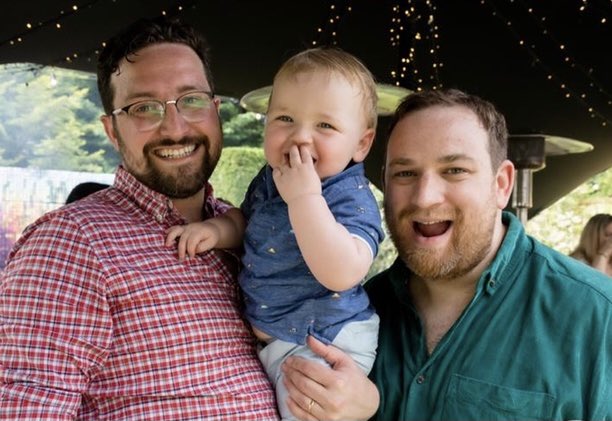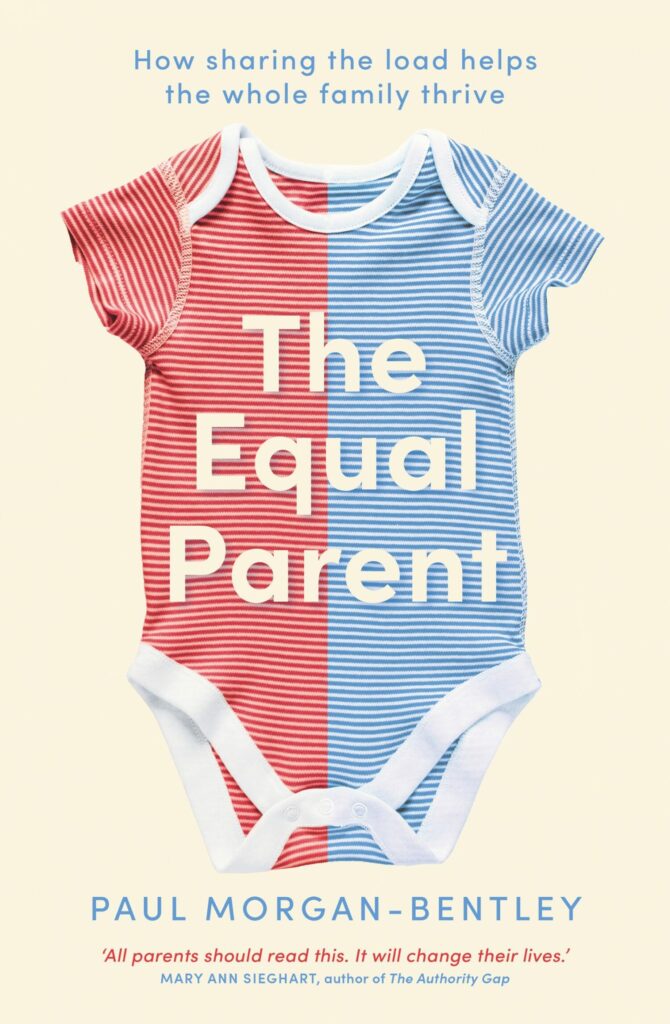The Equal Parent Exclusive Extract
An exclusive extract of The Equal Parent by Paul Morgan-Bentley.
In so many other areas of life there has rightly been a destruction of traditional gender stereotypes. It is outrageous to believe anything other than that women are equal to men at work, that they – shock-horror – have libidos, that men can be creative, sew and bake. Children’s books celebrate girls climbing trees, becoming doctors and playing football. Yet while women work as hard as men professionally, they are also presumed, almost always, to be the parent with primary responsibility. No matter how involved a father is in his child’s care, he is, at best, expected to be the other parent. This is something that is ingrained in us as children and then reinforced if you are expecting a baby, from as early as the first medical appointment.
Of course the woman is the focus during pregnancy, but do health service leaflets, websites and posters on the walls of maternity units have to reduce fathers’ roles to just helping to build furniture and sometimes offering to change a nappy? Why are so many fathers banished from hospitals within a few hours of their child’s first breath, treated like visitors, when they could be encouraged to spend those formative moments caring for their new child together with the mother, as a team, finally able to share the responsibility now the baby is no longer in her body? Why are nurses so shocked when a father brings his child to a vaccination appointment? Why do schools almost always seem to call the mother when a child is unwell, even when her child has two parents and both of them work? Often it seems as if the institutions that we lean on as parents – the healthcare services, schools and workplaces – are failing to keep up with how society is already evolving. When it comes to children, the default expectation remains that a woman will be there for them at all times, whether or not they have a partner and want to share the duties as well as the love.

When I am not looking after my son and getting angry about hospital websites, I am an investigative journalist at The Times newspaper in London and specialise in in-depth reporting and undercover work. I am also a gay man and live with my husband, Robin, and our son, Solly, on the outskirts of London. Robin took extended parental leave after Solly was born through surrogacy, so we were both off work with him together for the first six weeks of his life and then Robin took over for most of the second half of the year. With Solly having two fathers, we have had the relatively unusual experience of coming to parenthood without any expectations as to who should perform which roles. While we have not always succeeded – and have often spectacularly failed – we have tried to split the responsibility for our son as equally as possible.
Although my experience as a gay dad has, I think, offered me a particular perspective on how unequal parenting can often be for men and women, this is not a book about same-sex parenting. It is also not a ‘Men’s Lives Matter’ or ‘Fathers for Justice’ rant. It is absolutely not a call to erase motherhood or women’s experiences. I would never claim to be able to speak for women – or mothers. In writing this book, I interviewed a range of women, from those who agreed that dads could be equal parents to those who challenged my views. I am not a parenting expert, and this is not a book that will tell you how to get your baby to nap, what to feed your baby, how to treat nappy rash or which bottles are best for colic. This is though, I hope, a book for anyone as mystified as my husband and I are as to why it is still so rare for parents to split responsibility for their children equally and why it is seen as unusual for men to care for their children in a nurturing way. It is about my first-hand experiences of being a man on extended leave from work with a baby, and about what that has meant, from the funny to the exhausting. It is about the chemist who called me ‘MummyDaddy’, the breastfeeding mothers at baby classes who could not have been less bothered that I was there with them and the woman in the café who offered to be our son’s mother because she could not believe he would be properly cared for by male parents.
I have described the utter joy and terror my husband and I felt caring for our son at hospital on the first night of his life and our bewilderment that other dads often are not allowed to experience this, and that mothers have to do this alone, after giving birth, sometimes when they cannot walk following an epidural or cannot carry anything after a caesarean section. I have investigated why men do not usually take proper time off work in the first year of their children’s lives when this is legally allowed in many countries. Surely gender equality does not just mean women working as hard as men professionally. It means men also working as hard as women in other aspects of life. It means men telling their bosses that they are taking leave from work to care for their children, and workplaces and governments seeing the benefits of encouraging this. It means men feeling the insecurity that comes with returning to work, putting in requests for more flexible working and wondering if everyone has forgotten them or holds a grudge about them having been away. It means experiencing colleagues and acquaintances saying things like ‘how was your time off?’ or ‘you must feel rested’ after the most exhausting months of their lives keeping a baby alive and happy. It means hiring managers not being able to discriminate against women in their twenties and thirties on the grounds that they might take maternity leave soon because the same would be true of men.
I wrote this book as a celebration of men caring for their children and to explore the truths behind the lazy assumptions we can all sometimes find ourselves making about parental roles. Whenever I refer to parents, I mean any adult who has responsibility for a child. This can include non-genetic parents, adoptive parents, parents with or without a romantic life partner and other legal guardians. As far as I am concerned, parenting is about the actual role of looking after a child, not genetics.
I spoke to leading researchers about the science of mothers’ and fathers’ instincts and the outcomes for children whose parents, regardless of their sex or genetics, are fully engaged. I wanted to understand the impact parenting gender stereotypes have on our sons and daughters and what this means they grow up expecting they should be as men and women. There is no doubt that there has already been progress towards parenting equality. I cannot think of a single father of my age who has not changed nappies. The same could not be said of my father’s generation of men. However, we need to acknowledge how far there still is to go.
Men who go to baby classes, children’s doctor appointments and do the nursery or school run are often now praised for being ‘hands-on’ dads. ‘He is wonderfully hands-on,’ someone will say, because a father does a bottle feed at 11 p.m. every day. Imagine saying that a mother is ‘hands-on’ because she bothers to pick up her child from school. That this sounds ridiculous when applied to a mother, but not to a father, demonstrates how far away we are still from achieving proper equality of the sexes.
My experience of parenting has led me to believe passionately that fathers should be doing everything they can to be fully present during substantial periods of their babies’ lives. It should not be unusual for dads to be as immersed as mothers in the endless maths that is tweaking feeding and sleeping schedules, or to be as involved as mothers in decisions about whether to do any sleep training and how to wean babies onto solid food. Fathers should be around enough to see their share of those first gassy smiles, the first rolls, for the mind-numbing monotony of Cocomelon, Little Baby Bum and Paw Patrol – and, indeed, for the comments from other parents who ‘absolutely never’ let their children watch TV. Men should feel such responsibility for their babies that they wake as easily as mothers do at the sound of a cry from the monitor.
While over the past few years I have read as much research as I have Julia Donaldson books, and I have interviewed lots of mothers, fathers, scientists and parenting experts, I do not have all of the answers as to how we can change the world and achieve parenting equality. But I hope that by sharing what I have found, and my family’s experiences, with honesty, that future might be a little less distant.
If a woman wants to go back to work after taking some of her maternity leave entitlement and have her male partner take over, she should be supported in doing so by a society that does not view this decision with suspicion. If a man wants to take extended parental leave to care for his baby, he should not feel masculine shame. This is a book about what we can all do – from individuals to medical staff, schools, businesses, community groups and governments – to encourage men to take their fair share of responsibility as parents, and why experts are convinced this will benefit all of us: mothers, fathers and, most importantly, our children.
The Equal Parent
Paul Morgan-Bentley
Is there a biological difference in mothers’ and fathers’ instincts? As new father Paul found himself lying awake with this question and more buzzing in his mind, he decided to go a mission to answer them.
-
Ebook
-
Audiobook
-
Paperback
